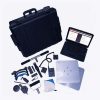
CEUs that Advance Your Career
Practice ManagementStrategizing your therapy CEUs can help you turn a requisite for licensure into a springboard for professional success. In a world of unlimited continuing education platforms, how do you choose a CEU that’s right for you?
Choosing rehab CEUs to achieve your professional goals
For rehab professionals, CEUs provide a great opportunity to reflect on your professional goals. Are you a new grad looking to develop your skills, or a seasoned clinician ready for a change in clinical setting? Have you thought about leaning in to a management role, or pursuing a position in academia?
Strategizing your therapy CEUs can help you turn a requisite for licensure into a springboard for professional success.
Aside from providing general guidelines, most state organizations and accrediting bodies leave much of the decision making up to the clinicians. In a world of unlimited continuing education platforms, how do you choose a CEU that’s right for you?
Focus on your goals
Looking at rehab CEUs through the lens of professional ambition can help you select courses with intention. Most practitioners identify goals in a yearly performance review, or through less formal self-reflection. Regardless, most people have an idea of something they’d like to accomplish professionally.
Most goals fit into one of four categories: maintaining licensure, transitioning to a new care setting, obtaining a specialty certification, or pursuing a role outside of clinical practice, such as management, administration, academia.
Before we dig in to these goals, the most important thing to remember is to check with your accrediting organizations to ensure compliance. An elaborate string of hand-therapy classes will not help you if you’re missing your mandatory Basic Life Support (BLS) training.
Your state and national accrediting organizations have the final say in what is required and what counts as continuing education.
Let’s take a look at our first goal, maintaining licensure.
Using rehab CEUs to maintain licensure
Maintaining licensure is a goal we all share. For some therapists, the sole purpose of continuing education is to keep their license in good standing. Many therapists strive to meet the requirements as efficiently and affordably as possible.
For starters, understanding your licensure requirements is essential, and could save you time and money.
For example, I have renewed my occupational therapy license three times. But I only realized on my third renewal that classes like BLS and Pennsylvania’s Mandatory Reporting of Child Abuse could all count as CEUs.
As a traveling therapist, I rely on online continuing education platforms to meet most of my occupational therapy CEU needs. A yearly subscription gives me unlimited access and helps me find classes that meet the requirements for all of the states I’m licensed in. I always look for classes that have been pre-approved by the state or AOTA for the added peace of mind.
If you have a continuing education budget from your employer, any platform that allows for unlimited CEUs can usually be reimbursed after you’ve completed your first course.
You can obtain other CEUs at work through projects and programs you are likely already participating in, including:
- Providing or receiving formal mentorship
- Attending employer provided workshops
- Providing in-services
- Providing community presentations
- Supervising fieldwork students
Using rehab CEUs to transition into a new care setting
Another professional goal that can help guide your selection of CEUs is transitioning to a new clinical practice setting. The option to take on a new challenge, learn a new set of skills, prevent burnout, or refresh your enthusiasm for the profession, are all reasons one might change practice settings.
Change is exciting, and the plethora of opportunities draws many people to a career in therapy. But the transition isn’t always easy. Entering an unfamiliar practice setting can make even a seasoned therapist feel like a new graduate.
With some strategic planning, you can earn CEUs while learning about your new setting. Just as you developed competencies as a new grad, you can earn CEUs by focusing on intervention, safety, and documentation for your new practice setting.
Dealing with a new patient population requires familiarity with the diagnoses and the appropriate interventions. Reading peer reviewed articles and completing the appropriate paperwork are great ways to earn CEUs while developing evidence-based practice interventions.
Safety, both the patient’s and yours, is another area you want to investigate when choosing CEUs. Specialty training for at-risk patients is crucial for providing the best care. For example, you would want additional safety training for working in an ICU, with recent surgical patients, or with infants in an early intervention program.
Search for trainings on the populations you determine vulnerable and specific strategies for keeping them safe, such as developing your understanding of lab values and vitals.
The last and often most challenging area to focus on when transitioning to a new care setting, is documentation. Lump together documentation and any new insurance or legal regulations, and you will likely have a lot to learn.
Since documentation and insurance aren’t the most interesting topics, use webinars to affordably access just the information you want. Web-based seminars are another great way to develop a broad base of knowledge without spending a lot of money.
Using rehab CEUs to earn a specialty certification
While obtaining a specialty certification can certainly be complicated, it may be the most straightforward method for choosing CEUs. Some certifications require one specific set of classes, such as LSVT Big or Neuro-IFRAH®.
Other certifications require a combination of clinical practice, portfolio development, specific courses, and an exam. For example, the American Board of Physical Therapists’ specialty certification in Acute Management of Injury and Illness requires therapists to have continuing education in injury and illness for conditions in sports medicine, CPR certification, and either a residency or 2,000 hours of direct patient care, prior to sitting for an exam.
Across the disciplines, some certifications correspond to college credits and courses, which can also be utilized as CEUs for your license. Any opportunity to capitalize on work you are already doing is a great strategy for obtaining your CEUs and reaching your goals.
Choosing specialty certifications and trainings is a great time to reflect on your practice area and your professional goals. Many certificates have their own CEU requirements in order to keep them in good standing. You want to pick something that is worth not only the initial investment, but the investment over time.
Certification-specific CEUs can remove some of the pressure of choosing the right course. But, if you switch specialties or practice areas, your certification may not be relevant.
Pursuing a non-clinical role with CEUs
Switching practice areas could mean you transition out of direct patient care entirely. The opportunity to advance your career is exciting, but requires a new set of skills. Focusing on the areas in your new role that require further development provides great guidance for choosing CEUs.
You can utilize some of the same strategies discussed when meeting the previous goals. Formal mentorship, academic classwork, and web-based courses to focus on the gritty details of policy and procedure, are all valid CEU options.
You can also use you newly gained power to organize in-house CEU courses for your team.
Tools to get you started
If you need help identifying your professional goals, start with your national organization’s professional development tools. You might even earn a few CEUs in the process.
For example, AOTA’s Professional Development Tool (PDT) helps members identify areas of improvement.
For Physical Therapists, APTA provides Self Assessment Tools to help evaluate your professional strengths and opportunities for improvement.
Whether you want to maintain your licensure, transition to a new practice setting, earn a specialty certification, or take on a role in management or education, CEUs can help get you there.
By aligning your CEUs with your professional development goals, you can accomplish both more effectively. Along the way, you’ll experience opportunities that are both inspiring and rewarding.
Corrine McGrail MS, OTR/L, CBIS





